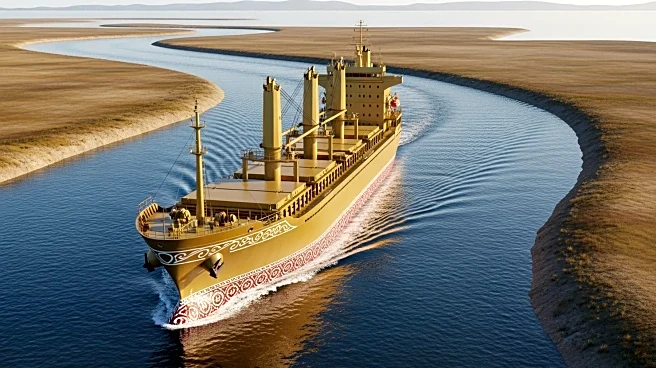What's Happening?
The Suez Canal Authority is actively engaging with the shipping industry following a notable increase in transit volumes, marking the highest monthly rate of returning vessels since the regional crisis began in late 2023. In October, the canal saw a 10
percent increase in tonnage compared to the previous year, although the number of ships only improved by two percent, indicating larger vessels are now transiting. Admiral Ossama Rabiee, Chairman of the Suez Canal Authority, hosted a meeting with representatives from 20 major shipping companies to discuss developments in the Red Sea and Bab el-Mandeb region. The authority is inviting shipping lines to conduct trial voyages, with companies like CMA CGM planning to increase their voyages through the canal. Other carriers, such as Hapag-Lloyd and MSC Mediterranean Shipping Company, are monitoring the situation, while Evergreen and COSCO are ready to resume operations once stability is assured.
Why It's Important?
The Suez Canal is a critical maritime route for global trade, and its operational status significantly impacts shipping logistics and costs. The recent increase in transit volumes suggests a potential recovery from disruptions caused by regional conflicts. This development is crucial for shipping companies, as it may lead to reduced transit times and costs, enhancing efficiency in global supply chains. However, the high cost of marine insurance remains a significant barrier, as highlighted by the Inchcape Shipping Agency. The ability of the Suez Canal to attract major shipping lines back could stabilize shipping routes and contribute to economic recovery in the region, benefiting both local economies and international trade stakeholders.
What's Next?
The Suez Canal Authority is expected to continue its outreach efforts to encourage more shipping companies to return. As stability in the region improves, more companies may resume their operations through the canal, potentially leading to increased competition and lower shipping costs. The authority's periodic meetings with industry representatives will likely focus on addressing insurance cost concerns and ensuring safe passage for vessels. Shipping companies will be closely monitoring the situation, and their decisions will depend on the ongoing geopolitical stability and insurance cost adjustments.
Beyond the Headlines
The reopening of the Suez Canal to larger vessels could have long-term implications for global trade patterns, potentially shifting some routes back to traditional paths through the canal. This may also influence geopolitical dynamics in the region, as countries dependent on the canal for trade may seek to ensure its security and stability. Additionally, the insurance industry may need to adapt to changing risk assessments, potentially leading to new policies and pricing structures.















